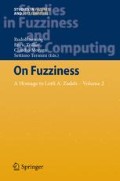Abstract
Typically, when a computer performs a task, it can be seen as a calculation or a reckoning. For example, consider a simple arcade video game where the machine continuously gets input from the user and computes the new position of some “characters” that move on a board, etc. A particularly interesting aspect of computation is that the majority of people understand it as an exact function. Nevertheless, this is an excessive expectation or requirement, depending on how one perceives computation. In particular, users expect computer programs to deliver exact results while computer programmers work under the assumption that everything is precisely defined and no vagueness arises anywhere.
Access this chapter
Tax calculation will be finalised at checkout
Purchases are for personal use only
Preview
Unable to display preview. Download preview PDF.
References
Sánchez Álvarez, D., Gómez Skarmeta, A.F.: A Fuzzy Language. Fuzzy Sets and Systems 141, 335–390 (2002)
Black, M.: Vagueness. An Exercise in Logical Analysis. Philosophy of Science 4(4), 427–455 (1937)
Cleland, C.E.: On Effective Procedures. Minds and Machines 12, 159–179 (2002)
Cook, D.B.: Probability and Schrödinger’s Mechanics. World Scientific, Singapore (2002)
Kandel, A., Langholz, G. (eds.): Fuzzy Hardware: Architectures and Applications. Kluwer Academic Publishers, Dordrecht (1997)
Klir, G.J., Yuan, B.: Fuzzy Sets and Fuzzy Logic: Theory and Applications. Prentice Hall (Sd) (1995)
Kosko, B.: Fuzziness vs. Probability. International Journal of General Systems 17(2), 211–240 (1990)
Păun, G.: Membrane Computing: An Introduction. Springer, Berlin (2002)
Russell, B.: Vagueness. Australasian Journal of Philosophy 1(2), 84–92 (1923)
Santos, E.S.: Fuzzy Algorithms. Information and Control 17, 326–339 (1970)
Sorensen, R.: Vagueness. In: Zalta, E.N. (ed.) The Stanford Encyclopedia of Philosophy, Fall 2008 edition (2008)
Syropoulos, A.: Fuzzifying P Systems. The Computer Journal 49(5), 619–628 (2006)
Syropoulos, A.: Fuzzy Computability. Book in preparation (2012)
Syropoulos, A.: On Generalized Fuzzy Multisets and their Use in Computation. To appear in the Iranian Journal of Fuzzy Systems (2012)
Taylor, J.R.: An Introduction to Error Analysis: The Study of Uncertainties in Physical Measurements, 2nd edn. University Science Books, Sausalito (1997)
Turing, A.M.: On Computable Numbers, With an Application to the Entscheidungsproblem. Proceedings of the London Mathematical Society 42, 230–265 (1936)
Zadeh, L.A.: Fuzzy Algorithms. Information and Control 12, 94–102 (1968)
Zadeh, L.A.: Discussion: Probability Theory and Fuzzy Logic Are Complementary Rather Than Competitive. Technometrics 37(3), 271–276 (1995)
Author information
Authors and Affiliations
Editor information
Editors and Affiliations
Rights and permissions
Copyright information
© 2013 Springer-Verlag Berlin Heidelberg
About this chapter
Cite this chapter
Syropoulos, A. (2013). Vague Computing Is the Natural Way to Compute!. In: Seising, R., Trillas, E., Moraga, C., Termini, S. (eds) On Fuzziness. Studies in Fuzziness and Soft Computing, vol 299. Springer, Berlin, Heidelberg. https://doi.org/10.1007/978-3-642-35644-5_32
Download citation
DOI: https://doi.org/10.1007/978-3-642-35644-5_32
Publisher Name: Springer, Berlin, Heidelberg
Print ISBN: 978-3-642-35643-8
Online ISBN: 978-3-642-35644-5
eBook Packages: EngineeringEngineering (R0)

